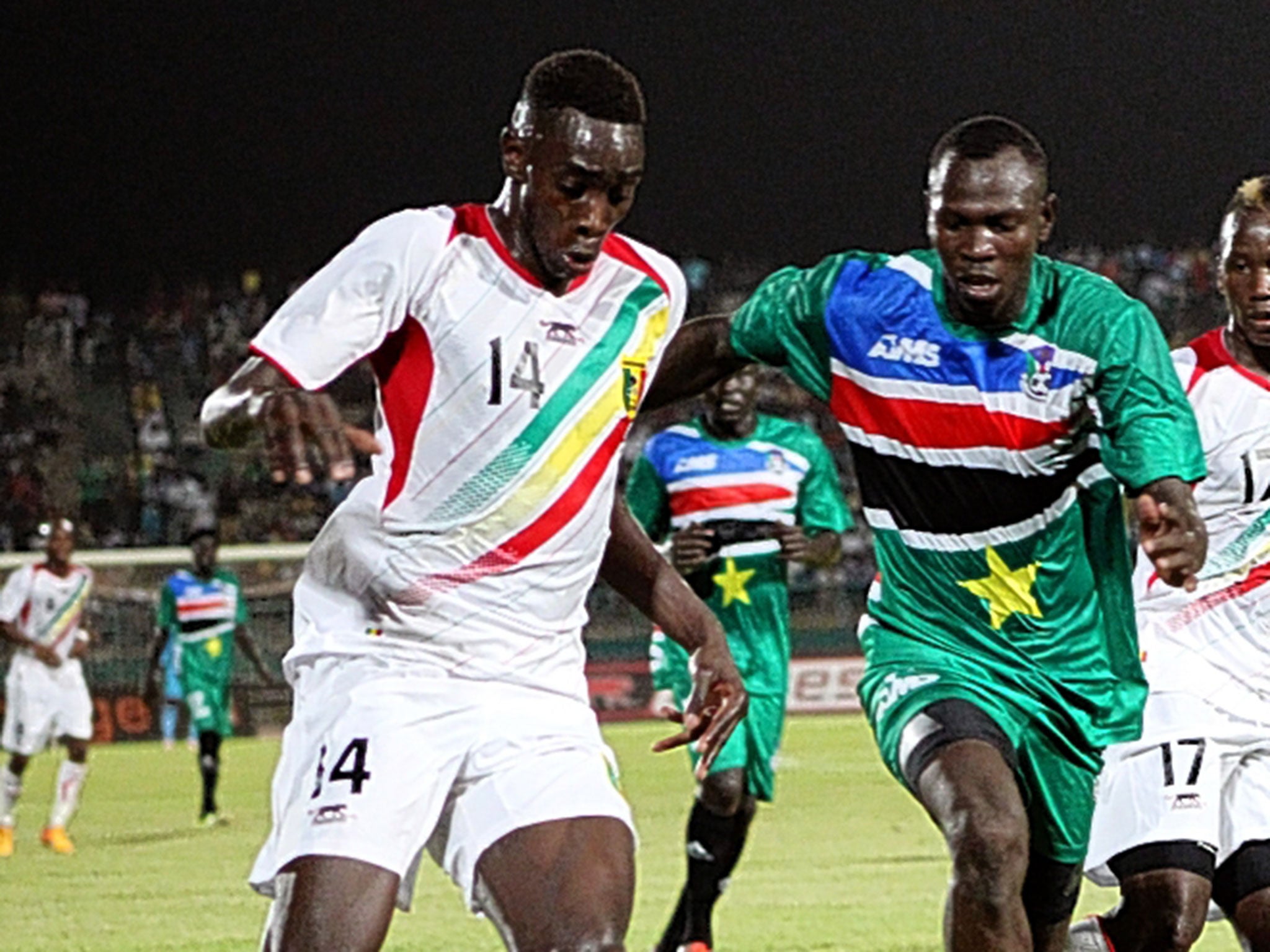World Cup: First steps for South Sudan on to a global stage – from a war zone
As South Sudan, torn apart by violence, prepares to play its first-ever World Cup qualifier, Robert O’Connor discovers a game sinking into disarray in a land where tribalism and civil war are kings

At 4.30pm East Africa Time on Thursday, the World Cup will welcome its newest participants when South Sudan start their first-round qualifier against Mauritania in the country’s capital Juba. It should have been a cause for celebration.
Instead, in the words of the president of the South Sudan Football Association (SSFA), Chabur Goc Ali: “Malakal [a city in the north-east of the country] is a war zone. There’s no way you can play football there. You can’t even put a team together because there’s nobody there. They’ve all been displaced by the war.”
Looking out across central Juba from the window of his office, Chabur cuts a worried figure. Since the world’s newest country collapsed into a violent civil war in 2013, just two years after declaring a hard-fought independence from its northern neighbour, worry has become something of a way of life in South Sudan.
Malakal isn’t the only part of the country where football has become impossible. All over South Sudan, the country’s Premier League is being hit hard as more and more provinces fall victim to this brutal war.
“So far, we’ve lost six teams from areas affected by the conflict,” says Chabur. “It’s very simple. The war means we can’t give these teams the chance to participate in our football now.”
The war, which began when the country’s president, Salva Kiir, publicly accused deputies in his office of conspiring to overthrow him, is thought to have claimed up to 100,000 lives and has brought many of the country’s infrastructures to a virtual standstill.
We don’t have good stadiums or any good pitches for people – even children – to play on
In this fiercely ethnic conflict the battle lines are tribal, but as the SSFA stands on the brink of making history, Chabur sees his organisation as one that stands apart from the racial divisions that have left the country in chaos.
“The national team has representatives from most of the tribes in South Sudan. We have the Dinka, we have Nuer, we have Azande and so on. Even in my office, there are three or four tribes represented. Our country needs to come together as one tribe – one South Sudan. At the moment, in football, we are doing that.”
This ethic of unity, together with steadily improving results, offers genuine hope in this young country that, despite all the obstacles, football could still work here.
Certainly, the side will be looking to leave behind their chaotic early days in 2012 and the calamitous Cecafa [Council of East and Central African Football Associations] tournament in Kampala, Uganda. After South Sudan were knocked out in the first round the then coach, the Serbian Zoran Djordjevic, openly accused the SSFA of intentionally sabotaging his side’s chances.
“President Chabur and his federation broke our work,” he told a press conference after the 4-0 defeat to the host nation that sent the team home. “He betrayed the country and sabotaged this beautiful young people with great heart, great spirit and great willing. It’s a tragedy for South Sudan.”

Three years later, though results are slowly improving, Chabur’s relationship with the people he employs to run the team remains troubled.
“There is no support that comes from the association for the national team, either financially or spiritually,” says Korean Lee Sung-jea, the current manager. “It’s everything – management of match-day arrangements, care of the players, everything. We receive no support. There isn’t a single professional person working in the whole association.
“Without support from the association, the job becomes quite difficult. But we still do our job because football gives hope to the people of this troubled country,” he adds, echoing Djordjevic’s sentiment that, for the outsider at least, the South Sudanese cause is worth the fight.
But the problems are not going away. On Chabur’s desk are detailed plans for a sprawling, state-of-the-art headquarters for the SSFA, which he hopes will haul the organisation into the 21st century. Meanwhile, the game itself drags its knuckles in the dirt, its domestic league collapsing and the national side crippled by chronic mismanagement.
The SSFA’s message seems deeply conflicted. “Our problems are made worse by the fact that we have such poor infrastructures for football in South Sudan,” says Chabur. “We don’t have good stadiums or any good pitches for people to play on. There isn’t really even anywhere for children to play football.” As he speaks, he idly flicks through the plans for his organisation’s ultra-modern complex, seemingly unaware of, or just untroubled by, his contradiction.
“There is no money from the government, not whilst there is this war,” he concedes. “Our money comes from Fifa and from Mr Blatter. [Fifa president Sepp] Blatter has been very good to African football; he has brought a lot of hope and happiness here. He has been the best thing for South Sudan football.”
Last month, South Sudan registered a first competitive victory – 2-0 against Equatorial Guinea – and Chabur can see a way through all the trouble.
“A lot of the players who have been displaced are now playing football again, for clubs in Juba,” he says. “Also the security situation has improved from last year, when we had to play our games in Sudan. Now we are back playing in Juba for the World Cup.”
Join our commenting forum
Join thought-provoking conversations, follow other Independent readers and see their replies
Comments